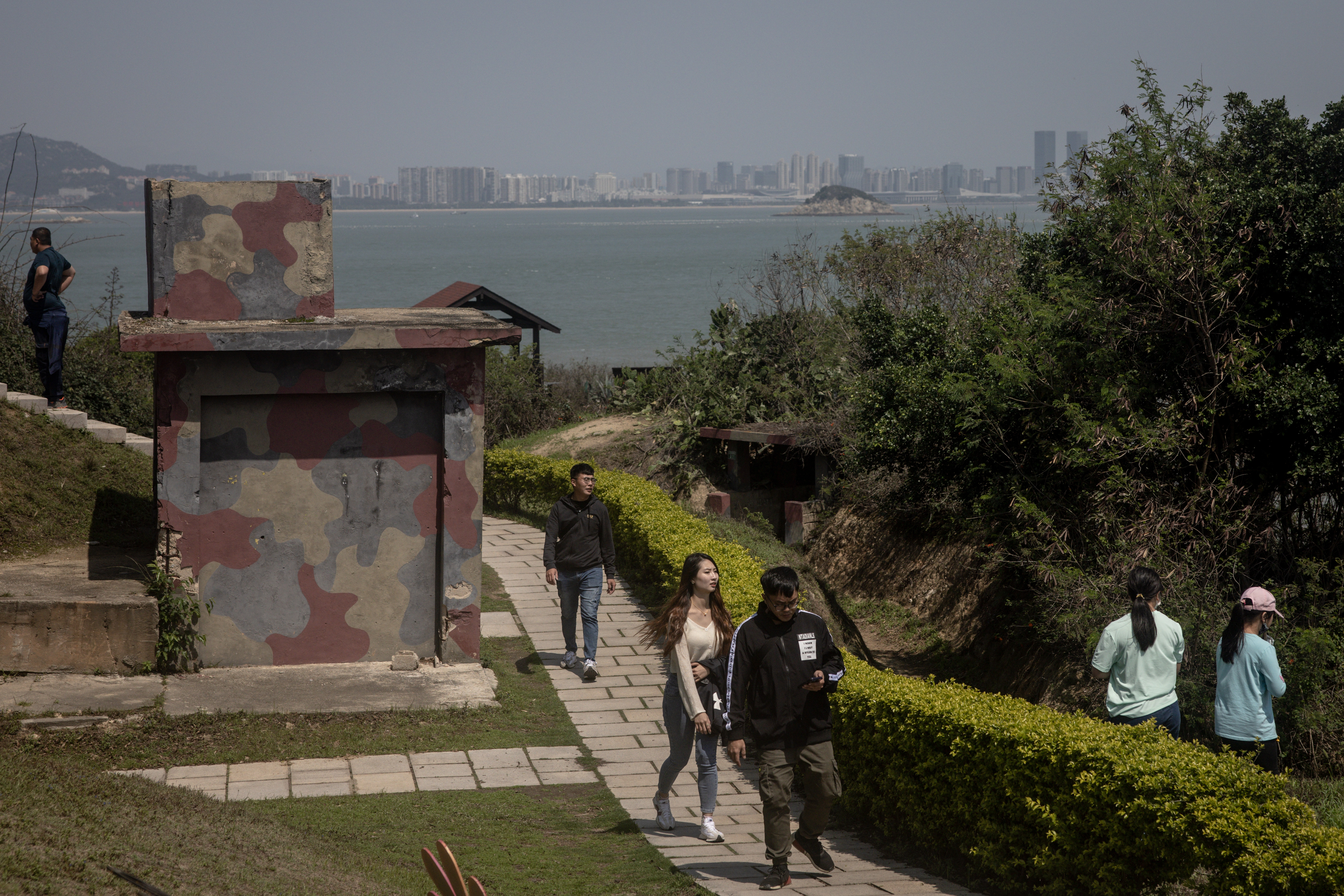
Kinmen Islands, Taiwan – On a warm, still evening in early June, Jason Lu parks his electric scooter near a beach on the small Taiwanese island of Kinmen. Lu, who wears a black T-shirt and glasses, pulls a bag out from under his scooter seat then heads down to the beach.
“Oh!” exclaims the 43-year-old once making it down to the shore.
Lu bends down to pick up a worn plastic bottle that has washed up beside his foot and puts it in his bag. “Wet Chinese plastic,” he says flatly. He points to the simplified Chinese characters on the packaging indicating the bottle’s origin – mainland China. Taiwan and Hong Kong use traditional Chinese characters.
Lu is not at the beach to stroll among the rusty anti-landing spikes protruding from concrete blocks – a reminder of Kinmen’s role as a front-line island between China and Taiwan. Nor has he come to marvel at the lights that now glitter in the dusk from the skyscrapers of the Chinese metropolis of Xiamen, less than 10km (6.2 miles) away across Xiamen Bay.
Instead, he has come to the western coast of Kinmen to collect rubbish.
When Lu is not working as an administrator at a local tourism office, he contributes to keeping Kinmen clean by picking up rubbish. Tides, weather and ocean currents as well as Kinmen’s proximity to Xiamen and the mouth of the polluted Jiulong River in China have left the island exposed to large quantities of waste. “Last week I was collecting on the east coast and next week I’ll go to the south,” Lu explains.
Lu was born and raised on Kinmen – the main island of a small archipelago of the same name which is home to about 140,000 people.
For many in Kinmen, Xiamen, a city of four million, represents a vibrant nightlife, abundant shopping and commercial opportunities, and home to friends and family. In comparison, the main island of Taiwan often feels distant, lying some 200km (124 miles) east of Kinmen across the Taiwan Strait.
But for Lu, Xiamen is a constant reminder of the plastic refuse that arrives on Kinmen’s shores each year. He also sees the waste problem as symbolic of the tensions between China and Taiwan.
“In recent years, it has been particularly bad,” he says of both.

‘Left with the mess’
While rubbish from China finds its way to Kinmen, tourists from the mainland haven’t for a while. “Unfortunately, it is mainly garbage that comes to us from China these days,” Lu says.
Although people from Kinmen can visit China and Chinese family members can visit Taiwan, the ferries connecting the isles to Xiamen are these days largely devoid of Chinese tourists – a stark contrast to the pre-COVID years when around one million Chinese would visit annually – their absence leading to a 50 to 80 percent loss in revenue for some Kinmen businesses.
Travel restrictions came about due to COVID and as relations between Taipei and Beijing have deteriorated. Beijing has long considered Taiwan to be part of China and in recent years, Chinese incursions into Taiwanese waters and airspace have grown more aggressive, leading to concerns of a possible invasion. Beijing sees Taiwan as a renegade province that must be “reunified” with China – and has not ruled out the use of military force to achieve this objective – while Tapei defends the self-ruled territory’s sovereignty. Last time tensions flared was during the 1995 to 1996 crisis in the Taiwan Strait when Chinese mobilisation activities and missile launches in the waters around Taiwan led to widespread fear of war.
However, this hostility goes back much further than the 1990s, and few have felt this more directly than Kinmenese.
Following the end of the Chinese Civil War in 1949, the Kinmen archipelago was turned into a front line between China and Taiwan and people’s way of life was upended by artillery barrages and martial law. When the isles’ residents emerged from the conflict zone decades later, much had changed. Their sleepy islands had become an unrecognisable military stronghold, many knew someone who had been killed or maimed by Chinese shelling which had turned homes into rubble and the isolation had disrupted ties to the outside world. This left the Kinmense with deep scars but also instilled a strong sense of community and identity, one they see as distinct from the main island of Taiwan – with whom they share a government – and separate from China – with whom they share the same neighbourhood.
Those decades also seared a shared understanding into their collective memory. As Kinmen risks being caught again between China and Taiwan amid the current tensions, this understanding is on the lips of many in Kinmen: “War is ruthless, peace is priceless.”
“It is a saying that has become part of who we are and what we believe,” Lu explains.
He picks up a small plastic container in the sand and pops it into his bag. For him, the waste is also a reflection of what the longtime feud means for Kinmen. “They fight, and we are left with the mess,” he says.
“The story of the Taiwan conflict is rarely told from our perspective, even though it has defined our lives for generations, much more directly than in Taiwan [main island] or in China,” reflects Lu as he returns to his scooter, his bag full.
He says it is time to listen to those on the front line – before it is too late.
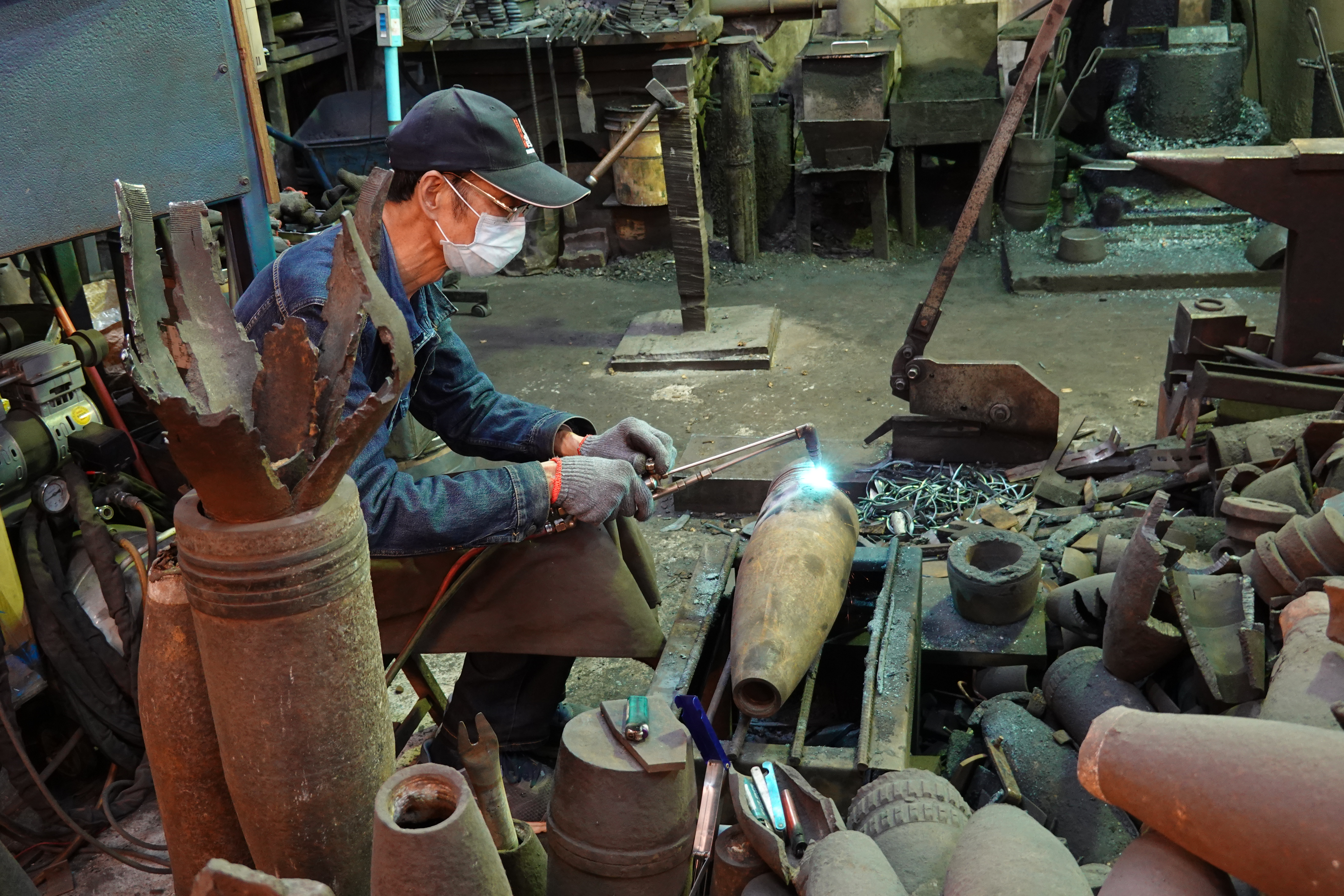
Childhood in a bomb shelter
Wu Tseng-dong, a tall, energetic blacksmith sporting jeans, a denim jacket, cap and protective gloves, rearranges a collection of shears in his cluttered Kinmen workshop. Wu, who was born in the late 1950s, is old enough to remember the conflict over the Kinmen Islands that took place between the 1950s and 1970s.
In 1949, after two decades of civil war, the Chinese Communists under the leadership of Chairman Mao Zedong had driven out the Chinese Nationalists under the leadership of Chiang Kai-shek from the Chinese mainland. Only the conquest of a series of islands in the Taiwan Strait – above all Taiwan island – stood between the Communists and an absolute victory. Taking Kinmen would provide a launching pad for further military campaigns in the strait.
To counter this, the Nationalists turned the Kinmen isles into a fortress. Hilltops were fortified with lookouts, beaches were mined and covered with anti-landing barricades while bedrock was blasted away in several locations to make way for naval and military installations.
The Nationalists imposed martial law in 1956 which entailed a nighttime curfew for the local civilian population who were also prevented from arriving or leaving thus cutting them off from the rest of the world. Throughout the 1950s, tens of thousands of soldiers arrived from Taiwan to reinforce the island, causing the military population to surpass the local one.
In 1949, 1954-1955 and 1958, Communist and Nationalist forces clashed around the isles, but with American equipment and support the Nationalists were able to repulse the attacking forces. The fighting was accompanied by heavy Chinese artillery shelling. When the fighting subsided in 1958, leaving hundreds dead, reduced shelling by China continued for the next two decades, with fewer casualties, interspersed with periods of intensification, and occasional bombarding of China by Taiwanese forces on Kinmen.
“I spent a lot of my childhood in the 50s and 60s in a bomb shelter,” Wu recalls when Al Jazeera met him in June for the second time. “Those were violent times.”
He remembers his frightened parents rushing the family into bomb shelters at night as Chinese shells rained down from above, and the next day emerging to assess the damage.
Wu would then run off with friends to find scrap metal from the exploded shells. They made a game out of it; whoever collected the most would win.
“The battle zone was our playground and war was our everyday life,” Wu says.
From the late 1950s, more of the falling shells had explosive ordinances replaced by propaganda leaflets that for example condemned American “imperialists” and hailed Communist “liberation” of Taiwan.
When the Chinese bombardments finally ceased in 1979, it was as an act of goodwill directed at the United States, Taiwan’s military ally, who cut diplomatic ties with Taipei to instead establish them with Beijing. By then, about a million artillery shells had struck the Kinmen islands.

Forging war into kitchen knives
Back in his workshop, Wu disappears for a moment behind a large furnace before returning with a Chinese artillery shell in his arms.
“Do not worry. It is not dangerous anymore,” he says quickly. “And these aren’t either,” he adds, referring to a large pile of shells on the concrete floor.
Wu collects shells that can still be found all over Kinmen and uses the steel coverings to craft into kitchen knives to then sell.
His father started collecting and reworking the shells when it was difficult to secure steel to forge and repair agricultural tools for Kinmen’s farmers following militarisation of the islands. But by the 1960s, soldiers from Taiwan serving on Kinmen began to request his father for ornamental and kitchen knives that they could take home as tokens of their military service. Wu took over the workshop in the 1970s and decided to focus almost exclusively on making knives.
Today, Maestro Wu, as both the man and his shop are known among locals, is a familiar figure in Kinmen renowned for his smithing. After China allowed its citizens to travel to Kinmen in the early 2000s, Chinese tourists began visiting Wu’s workshop where he would demonstrate his knife-making process, turning artillery steel into a wooden handled blade in less than 30 minutes. Sometimes, he would swap childhood stories with Chinese tourists. He was struck by how similar their experiences were to his own.
“Many Chinese on the other side have had a childhood in and out of bomb shelters like us,” he explains.
Chinese tourists from Xiamen also experienced propaganda leaflets – albeit from the Nationalists – falling on their city. “We agreed that both types of propaganda were equally ridiculous,” he says with a chuckle.
Wu has found growing up on opposite sides of the front line to not be a source of friction but rather as fostering a similar desire for peace.
He believes it is the responsibility of both sides to move away from confrontation. “Instead of scaring and fearing each other, there should be room for cooperation,” he says. “After all, we share the same roots.”
He misses the conversations he had with Chinese visitors, and their absence has made him more economically dependent on the Taiwanese market.
By turning Chinese war material into Taiwanese kitchen tools, Wu believes his work shows it is possible to forge a more conciliatory narrative about China and Taiwan. Initiatives that can bind the two together are desperately needed these days, he believes.
Back when Al Jazeera first met Wu in May 2022, he was certain that the tensions would blow over. Now, he is not so sure. “I don’t remember the situation in the Taiwan Strait being this tense since the 1990s.”

‘War tomorrow, today, in an hour’
“The 1990s were chaotic,” recalls Kinmen County’s deputy mayor, Li Wen-Liang, 51, who sits in an armchair in his office one afternoon in May. He wears a blue vest with the circular county government emblem of a white roof and blue background.
In the 1990s, Taiwan had one foot in authoritarianism and another in the democratic process while enmity with China had reached dangerous heights.
Intense popular pressure had compelled the powerful Nationalists, organised under the Kuomintang or Chinese Nationalist Party, to loosen their grip on the uncontested power they had held in Taiwan since the end of the civil war. The constitution was amended and the first free parliamentary election took place in 1991 while the first free presidential election was slated to be held in March 1996.
On the geopolitical stage, then-President Lee Teng-hui, who had been in office since 1988, had shifted Taiwan closer diplomatically to the US.
In September 1995, a 23-year-old Li arrived in Kinmen from Taiwan as a conscript. He saw how the liberalisation that was rolling through the main island had also reached Kinmen. Martial law was lifted in 1992 in the archipelago, ending more than 30 years of isolation, and the presence of soldiers had been reduced.
“Kinmen was still a well-manned fortress, but there was an optimism in the air, a feeling that better times were coming,” says Li.
However, the many changes in Taiwan caused a stir in Beijing. When President Lee visited the US in the summer of 1995, it was the last straw for the Chinese leadership. Fearing that Taiwan was moving towards independence, and seeking to undermine President Lee’s public support, the Chinese government ordered the launch of missiles into the waters around Taiwan.
The optimism Li had witnessed quickly evaporated as the missiles coupled with amphibious landing exercises in November 1995 brought back traumatic memories of the clashes in the 1950s.
The entire Kinmen military apparatus was put on high alert, according to Li, and he was regularly sent on coastal patrols where he could see large troop mobilisations around Xiamen. “It was a very difficult period,” he recalls.
“It was hard to eat and hard to sleep, because I didn’t know if we were going to war tomorrow, today, in an hour.”

Finding love in turmoil
Li therefore found himself in need of a mental refuge where he could distance himself from the thundering of war drums.
He found such refuge one day in a small family-owned cafe. But not because of the cafe’s location in the east or the food.
“I happened to be in there eating one day with some guys from my unit, and during the whole meal I couldn’t take my eyes off the cafe owner’s daughter,” says Li, blushing slightly.
He began visiting the cafe regularly, and eventually mustered the courage to strike up the first conversation with Chen Tsui-hung, the owner’s daughter. “I was probably as nervous as if I had to face the Chinese in battle,” recalls Li with a smile.
Still, Tsui-hung had a calmness about her that put Li at ease. “Talking to her was a wonderful contrast to the chaos that engulfed our world at the time,” he recalls.
But Li wasn’t the only soldier interested in Tsui-hung. So he decided he had to do something different to stand out.
He began speaking regularly with the cafe owner, the owner’s wife and some of Tsui-hung’s friends. Little by little he got to know them, and they got to know him.
“My hope was that in this way they would put in a good word for me when I one day asked her out,” explains Li with a twinkle in his eye.
He promised himself he would do that if they both made it through the crisis in the strait.
As the presidential election drew close, the crisis only deepened. The Chinese government announced live-fire drills near Penghu – a Taiwanese island group. There were concerns about a Chinese attack on Taiwan’s outlying islands. Panic spread in Taiwan, people moved money abroad and hoarded supplies, the stock market teetered and many clamoured to get flights out of Taiwan.
However, the dynamic began to change as US naval units started to arrive in the Taiwan Strait in support of Taiwan.
On March 23, the Taiwanese people elected the incumbent Lee as president and in April, the US and Japan reaffirmed their bilateral security alliance.
“Suddenly, Beijing faced a potential great war against not only Taiwan but also the United States and Japan, all of whom had more modern and more advanced firepower than the Chinese,” explains Yao-Yuan Yeh, a professor of international studies focussing on Taiwan, China and Japan at the University of St Thomas in the US.
China withdrew its forces and the missiles stopped falling in the sea. The status quo settled once more with Taiwan left to continue as a self-governed territory without being an independent country.
“I invited Tsui-hung to dinner with the approval of her parents and friends,” Li says.
The couple is now married and have three children. They live on Kinmen where Li also works as a university lecturer while Tsui-hung ran a cafeteria until recently.
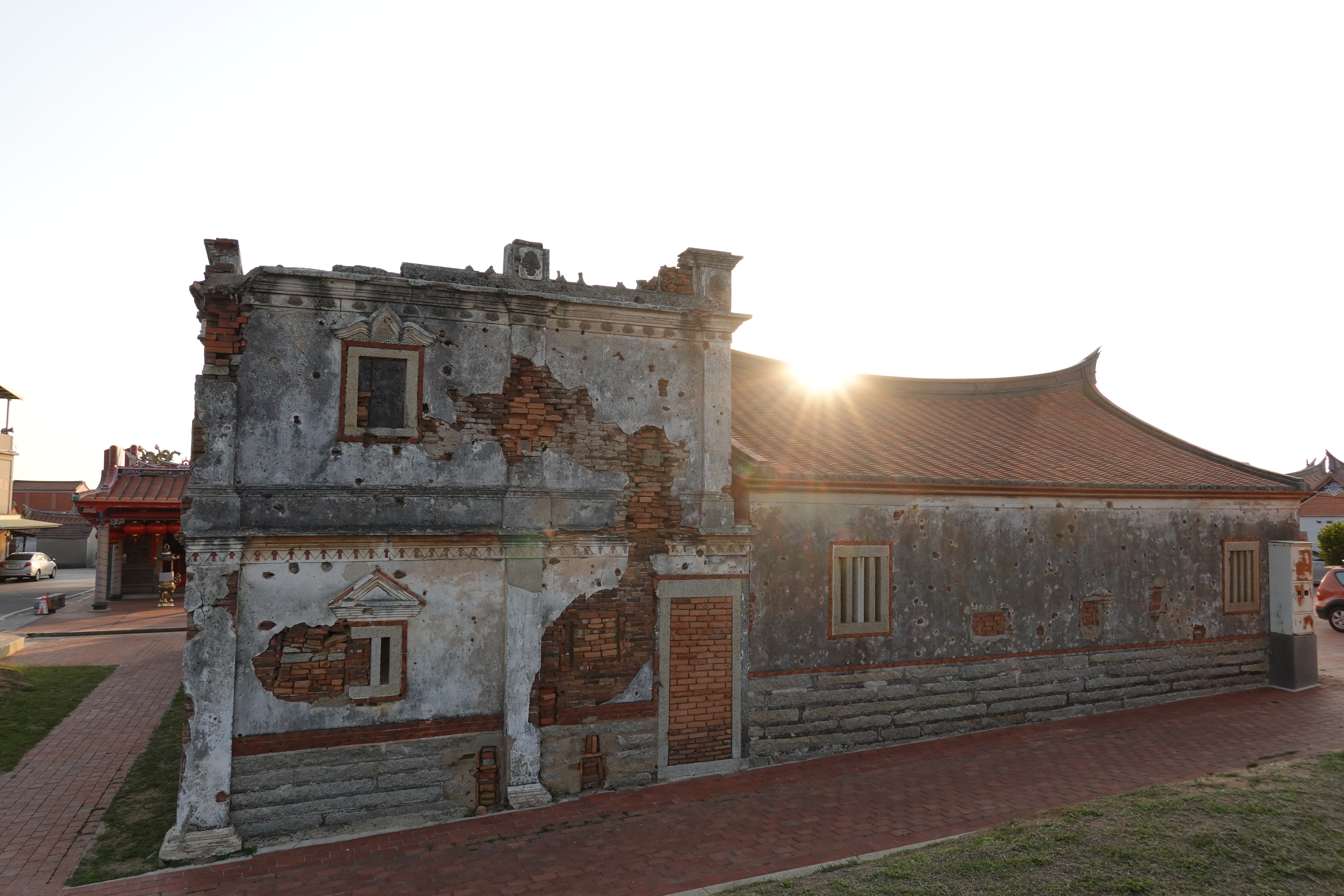
Tensions causing hardship
Today, however, China has sharpened its rhetoric towards Taiwan and reasserted its presence in the Taiwan Strait through expanded naval patrols and near-daily incursions into the island’s air defence identification zone. Taiwanese companies and institutions are facing political pressure and cyberattacks from China.
Meanwhile, Taiwan is allocating more money to its military, extending its compulsory military service from four months to one year and has expanded its diplomatic engagement with the West.
As in the past, the first shots have been fired near Kinmen. After Chinese drones crossed into Kinmen’s airspace last year, Taiwanese soldiers shot one down over the island.
Li fears that the situation could spiral out of control.
“Daily life may go on largely unaffected in Taiwan for now, but in Kinmen the current level of tensions is already a direct threat to the local livelihoods,” he says.
“Our exports and access to basic services are dependent on a functioning relationship between China and Taiwan.”
For example, the Chinese authorities suddenly banned the import of a group of alcoholic products from Taiwan at the end of last year including those made by a Kinmen distillery, which is one of the island’s biggest employers and sources of revenue. Earlier this year, the ban on Kinmenese liquor was abruptly lifted.
Sudden bans on Taiwanese goods like baby food, agricultural products and fish have become more frequent in recent years.
Li is concerned that a similar arbitrariness will affect other sectors such as Kinmen’s water supply, about 30 percent of which is secured through a pipeline from China.
The solution to the Chinese rubbish washing up on the island’s shores is similarly hitched to the state of China-Taiwan interactions.
Li says Kinmen County has tried to come to an agreement with the authorities in Xiamen to collect and dispose of the rubbish, but final approval from Beijing and Taipei is hard to come by these days.
“So as a public administrator on Kinmen, it is a daily challenge that geopolitical disputes stand in the way of practical solutions,” Li says with a sigh.
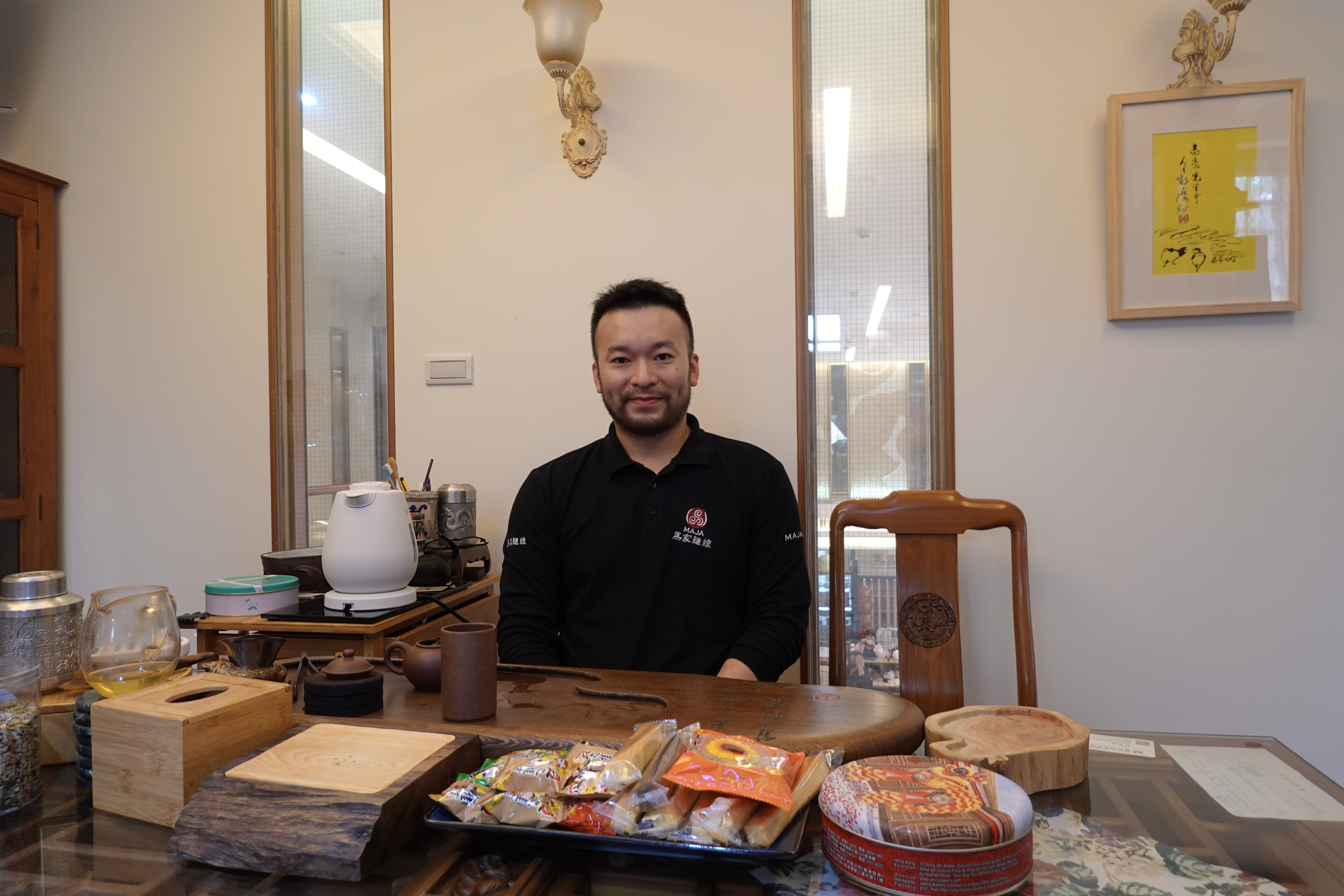
Fear of war
Ma Tsong-tin, 32, manages a noodle business in Kinmen that primarily exports products to Xiamen and often visits the city to nurture his business relationships.
A few years ago, he and his business contacts would talk about deeper cooperation between China and Taiwan. Today, it is the fear of war that dominates discussions.
“They tell me that the rhetoric in the media and from the Chinese government has grown very hostile towards Taiwan in recent years,” explains Ma in his office above his shop, where customers and tourists can try different noodle products, as he pours hot tea into small cups. “They are worried that it is all a prelude to an attack on Taiwan.”
Ma knows many Kinmenese who have taken precautions should war break out.
“Were that to happen, quite a few Kinmenese have plans of heading to safety in China where many have already acquired property,” he says and takes a sip of his tea. “But let’s hope it doesn’t come to that.”
Above all, he decries the consequences of the lack of Chinese tourists on his business in recent years.
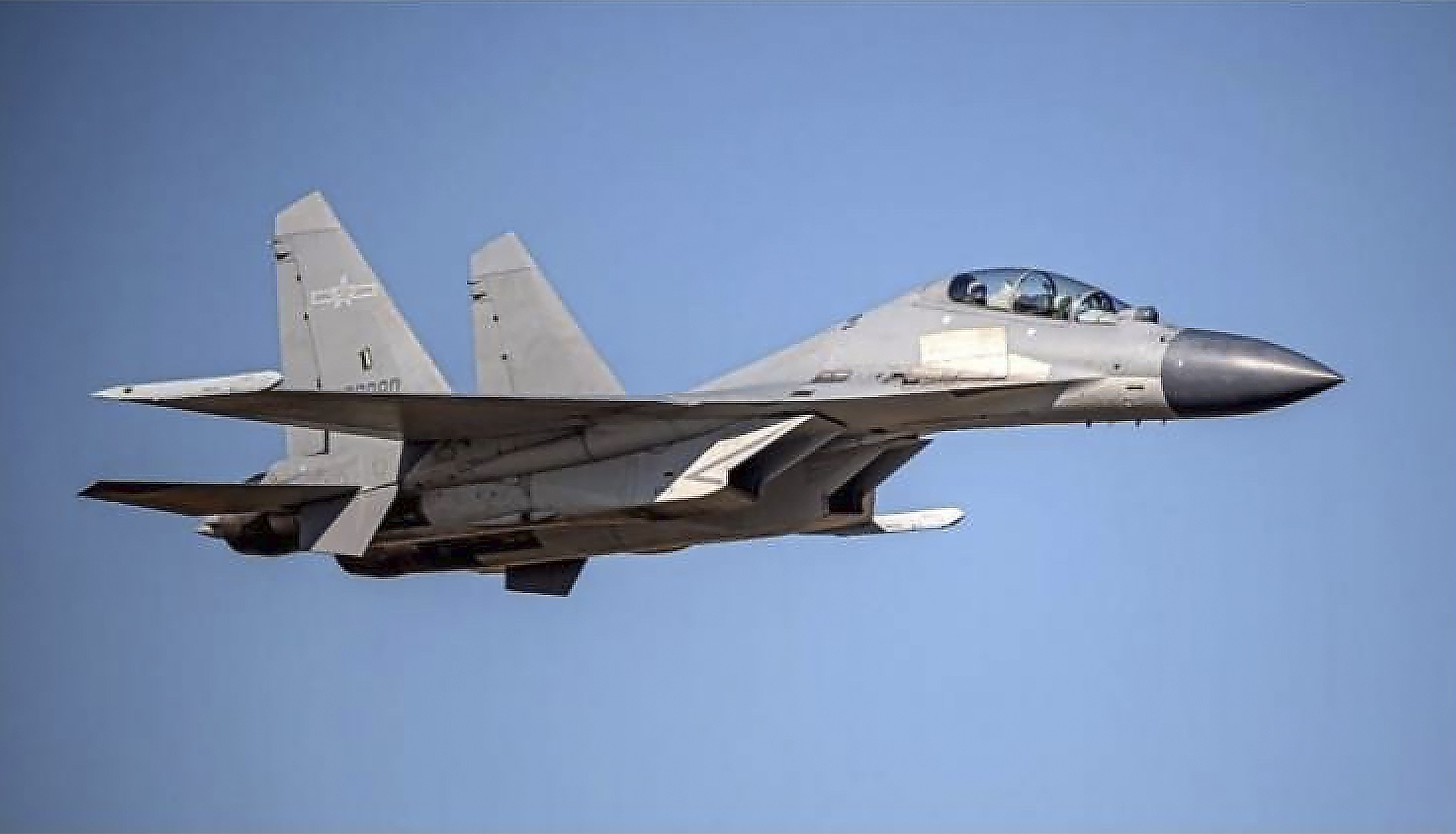
‘Taiwanese on paper’
The absence of Chinese tourists has also affected Rebecca Tung, who co-owns a restaurant on Kinmen. Tung, who is in her early 40s, is considering entering local politics to put more focus on what can be done on the Taiwanese side to improve relations with China.
She believes that China’s aggressive behaviour bears much of the blame for the current situation, but also that Taiwan has played a hand in aggravating China.
For example, she sees the Taiwanese leadership receiving former US House of Representatives speaker Nancy Pelosi in August 2022 as intended provocation.
Beijing responded by organising large military exercises around Taiwan.
Beijing reacted in a similar fashion when Taiwan President Tsai Ing-wen met with the current House Speaker, Kevin McCarthy, in California in April.
Tung believes such meetings serve little function beyond triggering China.
“And that increases the risk that life will be made more difficult for us on Kinmen,” she says.
At the same time, she sees the Taiwanese government as sometimes treating Kinmen as a vestige rather than an integrated part of Taiwan. She refers, among other things, to Taiwanese authorities banning Kinmenese meat products in Taiwan in recent years due to livestock disease outbreaks in China’s east.
“It is an alienation of Kinmen when we are treated differently from the rest of Taiwan in this way just because we are geographically closer to China,” she says.
According to her, other Kinmenese are unhappy with the political style adopted in Taipei.
“In Kinmen, we might be Taiwanese on paper, but it doesn’t always feel that way in reality when Taipei pursues a policy that burdens us with extra hardship.”

A small island
On a sunny summer’s day, the temperature creeping past 30 degrees Celsius (86 degrees Fahrenheit), Pecan Shui tries to catch his breath after descending Taiwushan, Kinmen’s highest point, with some friends.
Taiwushan, just 250 metres (820 feet) above sea level, offers a view of wheat and sorghum fields, woods, villages and the coastlines of central and eastern Kinmen. “You see how small Kinmen truly is,” says Shui, who is in his fifties.
It is this small size, he says, that has played a key part in shaping Kinmenese identity. People know each other, help their neighbours and look after their streets, temples and villages. It is a place where the pace of life is unhurried and people rise and go to sleep according to the cycle of the strong subtropical sun.
“And even though the military authorities in Taiwan scarred our island with bases, and we are currently acting as a waste site for Chinese rubbish, we have worked together to try to preserve Kinmen,” Shui says.
His friends, all high school classmates in the 1980s who have worked on Taiwan island but ended up back in Kinmen, agree.
“The island is a nice place to be,” says one friend, who declines to give their name. “It’s calm here and not as busy as in Taiwan.”
Although Taiwan and Kinmen have been part of the same territory since 1949, the experiences in both places have been markedly different, Shui points out.
“In Kinmen, we lived under a much harsher military rule until the 1990s than they did in Taiwan,” he explains.
Decades of nightly curfews stymied Kinmen’s nightlife, for example, as opposed to Taiwan where curfews were limited in scope. Even today, most activities move indoors after dark. This stands in contrast to Taiwan where night markets often keep people out until late in the evening.
And yet, Kinmen’s harsh history as a front-line island does not mean that Shui and his friends would rather be part of China.
“We have been part of the fight against the Communists for decades, and the freedoms we enjoy in Taiwan and Kinmen today are ones we helped pave the way for,” says another friend.
Nevertheless, Shui and his friends believe that Taiwan should do more to normalise relations with China.
“We must work towards peaceful coexistence with each other,” he says.

Dialogue and demilitarisation
The misgivings among Kinmenese about Taiwan’s policy towards China prompted a group of local councillors across the political spectrum to submit a petition to Taipei earlier this year.
The councillors called for the withdrawal of the few thousand remaining soldiers and to support the construction of a bridge linking Kinmen and Xiamen as part of a larger effort to turn the islands into a demilitarised zone that can serve as a place for dialogue between China and Taiwan.
Li Haolun, 25, the chief executive of the local branch of the Democratic Progressive Party, was involved in the discussions that led to the drafting of the letter.
He admits that the content is controversial, but believes that it was important for Kinmen’s political leadership to send a signal.
“A signal to both the Kinmenese voters and to the central government in Taipei that they want de-escalation and a more dialogue-oriented policy than the one currently being pursued,” he explains.
The presidential office has so far not commented on the letter.
Some Kinmenese in favour of the petition argue that in an era of advanced military capabilities, Kinmen has lost much of its previous strategic importance and that consequently there is no need for soldiers to remain on the island.
Yao-Yuan Yeh, the professor, acknowledges that Kinmen has lost much of its strategic significance over the years, but not its symbolic value. He will not rule out that a day may come when a Chinese president will need a victory in the Taiwan Strait but does not want to risk an all-out invasion of Taiwan.
“In that situation, a completely demilitarised Kinmen with a bridge connection to China would present an extremely easy target,” Yeh says.
And, according to him, a Chinese conquest of Kinmen would be a boost to a Chinese leader after past unsuccessful attempts to capture it.
Kinmen is also not without importance to Taiwan’s military. It is home to a string of surveillance stations that monitor activity in the surrounding sea.
“At a time when the disagreements not only between China and Taiwan but also between China and the United States are significant, it is inconceivable that steps will be taken to demilitarise Kinmen and integrate the island with China,” Yeh says.

‘Lie completely still’
Twenty-two-year-old university student Yang Shu-wen does not give much importance to the writings of local politicians, she admits, as she puts on a blue summer jacket and ties her long black hair up into a ponytail. It is Friday evening and Yang is standing outside a 7-Eleven with two friends. Yang is in favour of de-escalation but believes that Kinmen best contributes to it by not withdrawing Taiwanese soldiers or furthering integration with China.
“Kinmen is a small fish in a turbulent sea full of sharks, and the best thing we can do to avoid being eaten is to lie completely still,” she says, referring to a comparison often made in the isles.
“Isn’t that right?” she asks and sends a hard nudge towards her friends, Tang Shih-kai and Zhou Chun-hao, who are both busy on their iPhones.
Zhou is not interested in politics. Tang believes that “people should be careful about provoking Winnie the Pooh of China”, a reference used to criticise China’s leader Xi Jinping.
The friends are constantly checking Facebook. They are members of a group that searches for and posts about a natural night-time marvel around Kinmen – blue lights in the sea.
According to Zhou, chasing the algal light-emitting phenomenon is a fun distraction in his otherwise fairly uneventful routine on Kinmen.
Yang feels the same.
“For young people who live here on a daily basis, it can be quite boring,” she says.
Entertainment options are limited, and employment opportunities are lacking, they say, especially after the flood of Chinese tourists became a trickle. For that reason, they all plan to move to Taipei after they finish their university studies. Yang, who studies communications, has already secured a job as a translator after the summer.
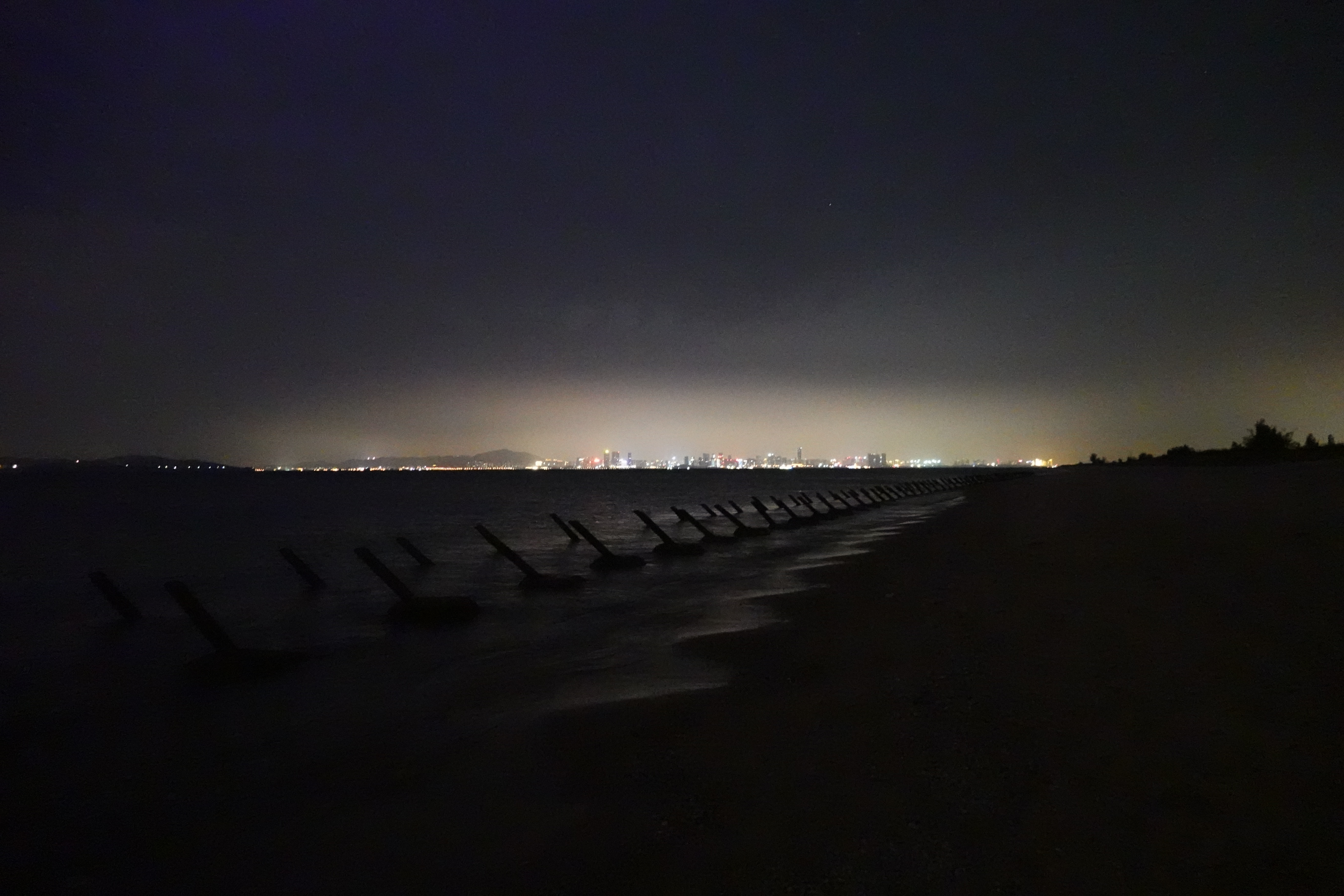
Blue tears
“Blue tears in the north!” Zhou suddenly exclaims and quickly pockets his phone.
The three rush towards their parked scooters.
On the way to Kinmen’s north coast, Yang explains that the lights known locally as “blue tears” can be seen around Kinmen’s coastline when the sea temperatures and the presence of certain nutrients washed out to sea from Chinese rivers create the right conditions for a certain type of algae to experience explosive growth. This alga has properties that cause it to emit a neon blue light when there is disturbance in the water around it.
Yang slows down and enters a small fishing port where she parks her scooter.
The three then sprint towards a walkway above a rocky shore where a large group of young people have already gathered and are staring intently down at the dark waves crashing against the rocks, their phones at the ready. In the distance, Xiamen’s skyscrapers illuminate the horizon.
“There!” Tang exclaims and points to a flash of neon blue.
“I missed it!” Yang says with disappointment.
“I got it!” Zhou cheers.
“It might be the last time I get the chance to see it before I leave for Taiwan,” Yang later reflects.
She says that the escalating tensions in the strait have often made her consider whether she should look for jobs further away than Taiwan. “But I don’t want to end up too far away,” she admits, adding that she might one day return to Kinmen.
“That seems to be the fate of so many Kinmenese that leave,” she says with a smile.
Yang hopes that by that time friendlier tones will be exchanged between China and Taiwan so that when Chinese people come ashore again to Kinmen, it will be as visitors.
“War is ruthless, peace is priceless,” she says.
“I pray that the conflict between China and Taiwan won’t engulf our little island again.”







